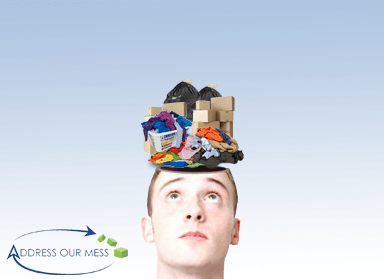 Clutter has a unique relationship with the human mind. In certain people, our brains compel us to clutter, but in others, that same clutter can cause us stress. It seems like an oxymoron that our brains make us clutter while simultaneously having a negative response to it. So which is true— are our brains causing us to clutter, or is our clutter clogging up our brains?
Clutter has a unique relationship with the human mind. In certain people, our brains compel us to clutter, but in others, that same clutter can cause us stress. It seems like an oxymoron that our brains make us clutter while simultaneously having a negative response to it. So which is true— are our brains causing us to clutter, or is our clutter clogging up our brains?
There’s a strong argument for our brains, affecting our clutter behavior. According to research from Yale University, we may actually associate physical pain with letting go of items. Researchers noticed that two primary parts of the brain respond when we’re presented with the thought of letting go of items—the anterior cingulate cortex (ACC) and the insula. The ACC helps determine our decision making processes and the insula determines our sensitivity to stimuli. Participants’ brains responded the same way to letting go of clutter as they would when feeling physical pain, like touching something too hot.
This brain reaction alone explains why so many people have trouble letting go of their belongings, especially hoarders. In cases like these, clutter happens because of how our brains are processing decisions. But some people are more affected by this than others. People who label themselves as “minimalists” have no problem letting go of clutter and clearly don’t have these same decision making issues.
But even if you don’t have trouble making decisions, a lot of households still end up cluttered due to busy schedules, physical limitations, and life generally getting in the way. Is the brain still affecting clutter in these situations? Researchers show that in these instances it may be the other way around.
A study from Princeton University showed that when humans try to perform tasks in cluttered environments, performance decreased and stress increased. Too much physical clutter overloads the brain with stimuli and forces it to work overtime. When we’re in cluttered environments, our brains are constantly receiving signals that something needs to be done. Clutter makes sure our brains are always working and this increases stress and anxiety levels.
Whether it’s our brains affecting clutter, or clutter affecting our brains, it seems that clutter is still a serious issue. For those who are struggling and can’t seem to get a hand on their clutter, Address Our Mess is here with cleanup professionals to help. We send out a team of technicians with a case manager to work with you to make decisions about all of your items, whether you’re going to keep, throw away, or donate them. At the end of the job, our goal is to make sure both your mental and physical spaces are clean and stress-free.